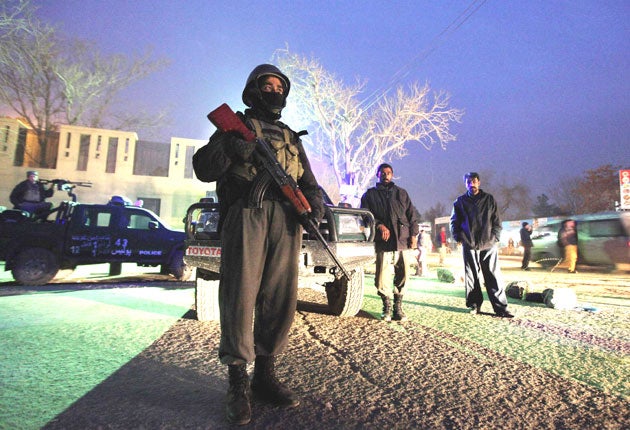Challenge to Karzai's right to rule after poll date is delayed
Afghan opposition groups call for caretaker government to take over from president

Afghanistan's presidential elections have been postponed until 20 August, three months after Hamid Karzai is supposed to step down, raising the possibility of a power vacuum when fighting is raging.
The Independent Election Commission (IEC) said yesterday that the poll had been delayed after consultation with Afghan and international security forces. "They told us there will be new security forces here... and they will guarantee security," said the commission's head, Azizullah Ludin.
Opposition groups immediately questioned President Karzai's right to rule in the run-up to polling day and called for a caretaker government to take over.
The palace insists Mr Karzai can rule on. Article 61 of the constitution states: "The presidential term shall expire on 1st of Jawza [22 May] of the fifth year after elections." But election officials insisted last night that the document was flawed and impossible to follow.
Critics of the government claimed the IEC, which has been accused of covering up widespread voter registration fraud, should be "renamed the Karzai Re-election Commission". One analyst said: "If this doesn't precipitate a crisis, at the least it will serve to prolong the President's term in office, which could further his chances of re-election."
Hussain Sancharaki, the main opposition spokesman, said: "After the 1st of Jawza the Karzai government will have no legitimacy." The Afghan parliament, the international community and the United Nations should create a temporary government until we have a new president."
Mr Ludin said the elections had been postponed to let America's 30,000-strong troop surge take full effect. The first soldiers began arriving this week.
Nato welcomed the announcement. The secretary general, Jaap de Hoop Scheffer, said the delay would give the International Security Assistance Force "time to work" on election support.
Dr Bashar Dost, one of the few declared presidential candidates, called for an emergency loya jirga, or meeting of tribal elders, to determine the country's future after 22 May. He said: "Karzai wants to stay an extra three months, and an extra three years. That's the way of Afghan kings and presidents. They like to keep power."
The news of the poll delay comes after The Independent revealed that Barack Obama's administration was courting Mr Karzai's challengers in Washington last week.
Western diplomats expressed a sense of relief that the IEC had finally named a date. There had been reports that the election might be called off because of fighting, and some analysts still fear that violence in the south and east will yet make polling impossible.
John Dempsey, head of the US Institute of Peace in Kabul, said Mr Karzai could turn to the Supreme Court to endorse his right to rule, but he warned that parliament has already refused to recognise the court's jurisdiction over constitutional disputes.
Zekria Barakzai, the IEC's deputy elections officer, insisted that a spring election, as prescribed by the constitution, would have been impossible because bad weather would have stopped people in the mountains from reaching polling stations. He said: "The constitution is flawed and contradictory. If you respect one part of the constitution you violate another."
August 20 is a few days before Ramadan. Article 61 also stipulates that, if no candidate gets more than 50 per cent of the vote, there should be a run-off within two weeks, which would fall in the middle of the month of fasting. Mr Barakzai said that, in the event of a run-off, the IEC would be forced to ignore the constitution once again.
Britain is helping fund the elections but a government spokesman refused to "speculate on the Afghan constitution".
Join our commenting forum
Join thought-provoking conversations, follow other Independent readers and see their replies
Comments
Bookmark popover
Removed from bookmarks